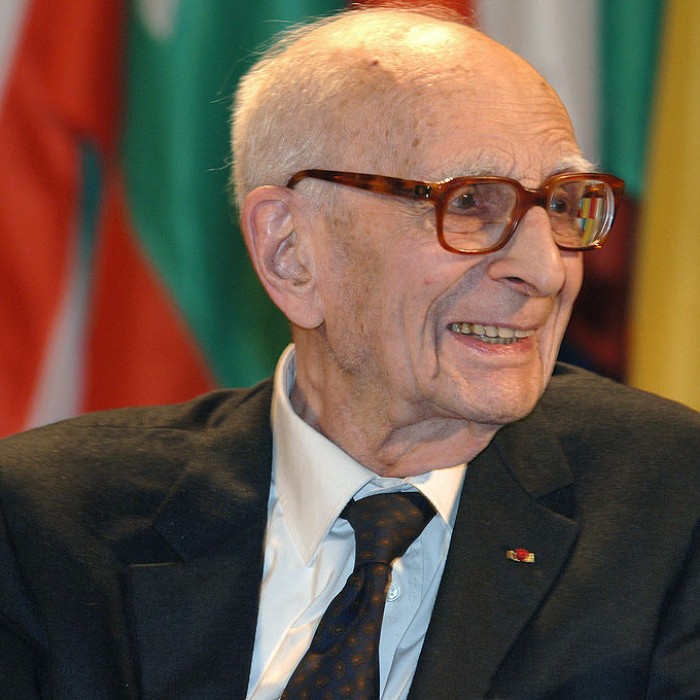
Claude Lévi-Strauss (28 November 1908 – 30 October 2009) was a French anthropologist and ethnologist.
His work was key in the development of the theory of structuralism and structural anthropology.
He held the chair of Social Anthropology at the Collège de France between 1959 and 1982 and was elected a member of the Académie française in 1973.
He received numerous honors from universities and institutions throughout the world and has been called, alongside James George Frazer and Franz Boas, the "father of modern anthropology".
Lévi-Strauss argued that the "savage" mind had the same structures as the "civilized" mind and that human characteristics are the same everywhere.
These observations culminated in his famous book Tristes Tropiques that established his position as one of the central figures in the structuralist school of thought.
As well as sociology, his ideas reached into many fields in the humanities, including philosophy.
Claude Lévi-Strauss was born to French Jewish parents who were living in Brussels at the time, where his father was working as a portrait painter.
He grew up in Paris, living on a street of the upscale 16th arrondissement named after the artist Claude Lorrain, whose work he admired and later wrote about.
During the First World War, he lived with his maternal grandfather, who was the rabbi of the synagogue of Versailles. He attended the Lycée Janson de Sailly and the Lycée Condorcet.
At the Sorbonne in Paris, Lévi-Strauss studied law and philosophy. He did not pursue his study of law, but passed the agrégation in philosophy in 1931.
In 1935, after a few years of secondary-school teaching, he took up a last-minute offer to be part of a French cultural mission to Brazil in which he would serve as a visiting professor of sociology at the University of São Paulo while his then wife, Dina, served as a visiting professor of ethnology.
The couple lived and did their anthropological work in Brazil from 1935 to 1939. During this time, while he was a visiting professor of sociology, Claude undertook his only ethnographic fieldwork.
In the 1980s, he suggested why he became vegetarian in pieces published in Italian daily newspaper La Repubblica and other publications anthologized in the posthumous book Nous sommes tous des cannibales (2013).
Lévi-Strauss returned to France in 1939 to take part in the war effort, and was assigned as a liaison agent to the Maginot Line.
After the French capitulation in 1940, he was employed at a lycée in Montpellier, but then was dismissed under the Vichy racial laws.
The Elementary Structures of Kinship was published the next year and quickly came to be regarded as one of the most important anthropological works on kinship.
Throughout the late 1940s and early 1950s, Lévi-Strauss continued to publish and experienced considerable professional success.
While Lévi-Strauss was well known in academic circles, in 1955 he became one of France's best known intellectuals by publishing Tristes Tropiques in Paris that year by Plon.
Lévi-Strauss was named to a chair in social anthropology at the Collège de France in 1959.
Lévi-Strauss completed the final volume of Mythologiques in 1971. On 14 May 1973, he was elected to the Académie française, France's highest honour for a writer.
In 2008, he became the first member of the Académie française to reach the age of 100 and one of the few living authors to have his works published in the Bibliothèque de la Pléiade.
On the death of Maurice Druon on 14 April 2009, he became the Dean of the Académie, its longest-serving member.
He died on 30 October 2009, a few weeks before his 101st birthday. The death was announced four days later.
For Lévi-Strauss, the methods of linguistics became a model for all his earlier examinations of society. His analogies usually are from phonology.
Lévi-Strauss proposed that universal laws must govern mythical thought and resolve this seeming paradox, producing similar myths in different cultures.
Lévi-Strauss developed the comparison of the Bricoleur and Engineer in The Savage Mind.
Lévi-Strauss's theory on the origin of the Trickster has been criticized on a number of points by anthropologists.
Source: Link

1564 - 1616

1803 – 1882

1854 – 1900

1942 – 2016

1928 – 2014

1835 – 1910

1869 – 1948

1884 – 1962
1898 – 1963

1929 – 1993

1879 – 1955

1809 – 1865

1807 – 1870

1800 – 1859

1795 – 1821

1755 – 1793

1984 -

1989 – 2011

1943 – 2001

1815 – 1902

1929 – 1994

1767 – 1848
